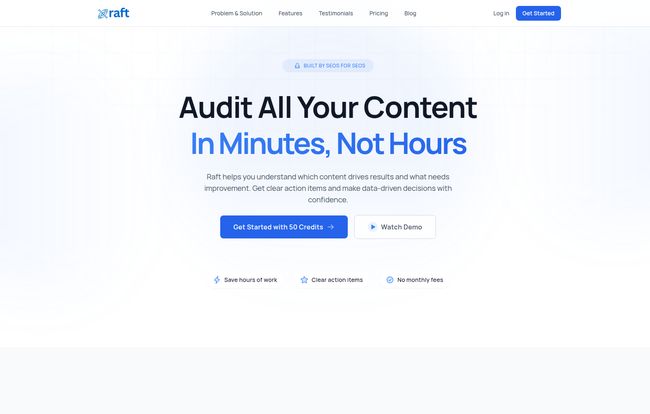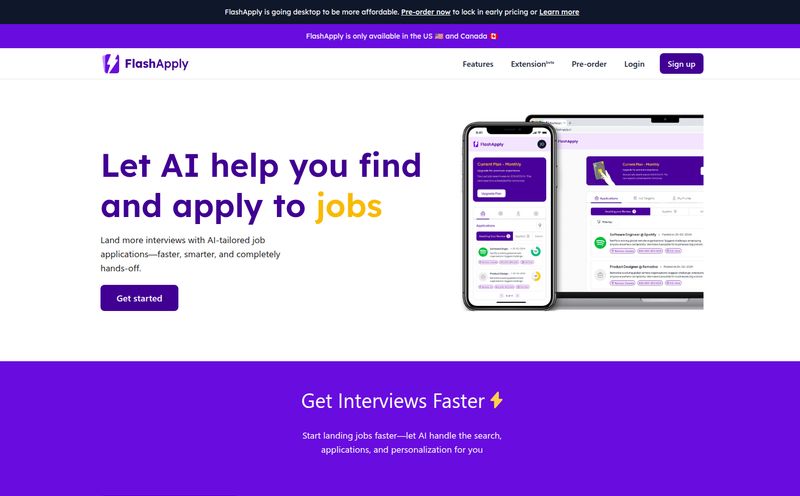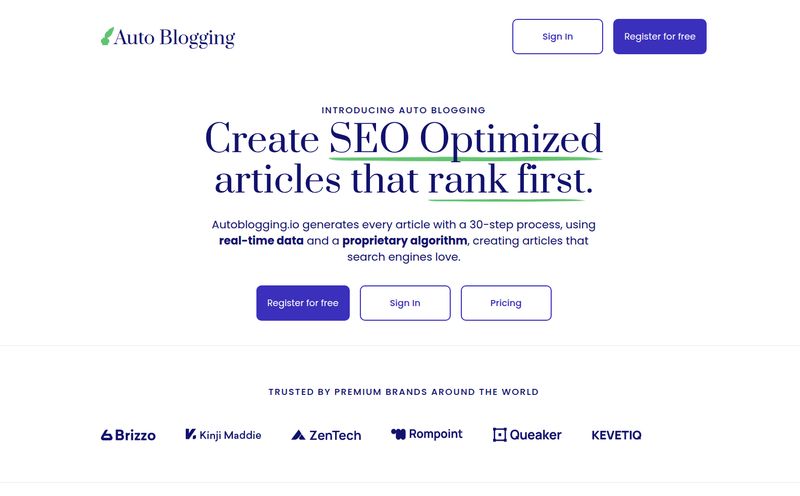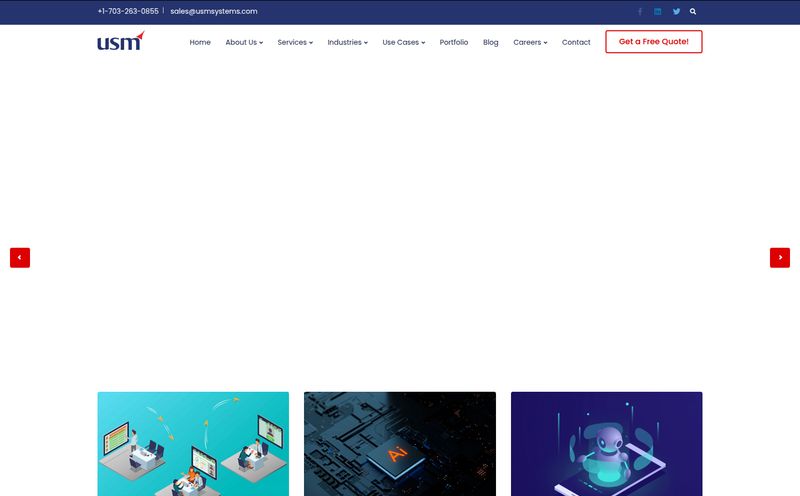If you’re an SEO or a content person, raise your hand if you’ve ever felt personally victimized by a content audit spreadsheet. You know the one. It has 47 tabs, a million VLOOKUPs that are probably broken, and data pulled from so many different sources that it starts to look like a ransom note. I’ve spent literal weeks of my life drowning in those spreadsheets, fueled by stale coffee and the quiet desperation of trying to figure out which of a client's 5,000 blog posts are actually doing something.
It’s the necessary evil of our industry. We have to do it. A good content audit is like spring cleaning for your website; it helps you find the hidden gems, toss out the junk that’s collecting dust and spiders, and figure out what’s actually making you money. But man, the process is a grind.
So when I saw a tool called Raft pop up, promising to do it all “in minutes, not hours,” my inner skeptic raised a very cynical eyebrow. Another tool promising to solve all my problems? Sure. But the other part of me, the part that still has nightmares about pivot tables, was intrigued. So I decided to take it for a spin. Here’s what I found.
First Off, What Is Raft, Really?
At its core, Raft is a dedicated content audit tool. It’s not trying to be an all-in-one SEO platform like Ahrefs or Semrush. It doesn’t do keyword research or backlink analysis. It does one thing: it audits your website content, and it aims to do it fast. Think of it less as a Swiss Army knife and more like a perfectly weighted, razor-sharp chef’s knife. It's built for a specific, crucial job.
The whole idea is to automate the soul-crushing data-gathering part of a content audit. It connects to your data sources (you'd assume Google Analytics and Search Console are the main players here) and pulls all that performance data for you. Then, it presents it in a way that helps you make actual decisions—keep, improve, consolidate, or delete. It’s the digital archeology shovel that saves you from digging with your bare hands.

Visit Raft
A Look at The Features
Okay, so it promises speed. But what are you actually getting inside the box? Here’s the breakdown of what caught my eye.
Seriously Fast Audits
This is their headline feature, and it holds up. The initial setup is straightforward, and once it gets going, it pulls data way faster than I could manually. For a site with a few hundred pages, you can genuinely have a workable dataset in minutes. For massive sites, it's still going to take a bit, but we’re comparing it to the days it could take to do manually. This feature alone is a massive quality-of-life improvement.
The Custom Scoring System is a Game-Changer
Now this is something that got my attention. Raft isn’t just a black box that spits out its own opinion. It lets you create a custom scoring system. Why is this so cool? Because not every business values the same metrics. An agency might have its own proprietary “Content Value Score” they use for all clients. An e-commerce site might weigh conversion-related metrics much higher than pageviews. A publisher might be all about engagement time. Being able to tweak the algorithm to fit your specific strategy is, frankly, brilliant. It shows they understand that SEO isn't one-size-fits-all.
Clear and Actionable Next Steps
I once presented a client with a 2000-row spreadsheet audit. Their eyes glazed over. I had failed. Data is useless if it doesn't lead to action. Raft seems to get this. It funnels your content into buckets like 'Keep,' 'Improve,' 'Merge,' or 'Prune.' This turns a mountain of data into a simple to-do list, which is something both SEOs and the clients who pay them can appreciate. No more analysis paralysis.
The Big Promise of AI-Powered Insights
Here’s where we have to have a real talk. The site touts “AI-Powered Insights.” In the SEO world of 2024, AI is the magic dust everyone is sprinkling on their products. Raft's plan is to use it to provide deeper optimization insights. However, as of my review, this feature is listed as “Coming Soon.”
Is that a dealbreaker? Not necessarily. The core functionality of the tool is solid on its own. But it’s something to be aware of. I’m genuinely excited to see what this looks like when it launches. If it can automate content brief generation or identify content gaps effectively, Raft could become an absolute powerhouse. For now, it’s a promising IOU.
The Pricing Model: A Breath of Fresh Air?
Let’s talk money. My credit card is tired of collecting monthly SaaS subscriptions. It’s a real problem. That’s why Raft’s pricing model felt like a cold drink on a hot day. There are no monthly fees.
Instead, it runs on a credit-based system. You buy a bundle of credits, and one credit equals one URL audit. They dont expire. I love this. It’s perfect for freelancers like me who might do a big audit one month and none the next. Or for in-house teams who only do a full content review once a quarter.
Here’s what the pricing looks like:
| Plan | Price | Audits Included | Best For |
|---|---|---|---|
| Starter | $49 | 2,000 URLs | Small websites and blogs |
| Pro | $199 | 10,000 URLs | Growing sites & SEO consultants |
| Business | $699 | 50,000 URLs | Agencies and large websites |
| Enterprise | Contact Sales | Custom | Large-scale, specific needs |
The Good, The Bad, and The "Coming Soon"
So, let's boil it down. After spending some time with it, here are my unfiltered thoughts. The tool is a huge time-saver, its flexible scoring system is a professional-grade feature, and the credit-based pricing is incredibly appealing to anyone with subscription fatigue. Getting clear action items instead of just a data dump is also a major win. I can see myself using this to kick off any major content strategy project.
On the flip side, the main drawback is that its most exciting feature—the AI insights—is still on the roadmap. And while I like the credit system, if you're managing a portfolio of colossal websites and need to run audits constantly, you might burn through credits quickly. Lastly, like any tool, its recommendations are a starting point. You still need a human brain to make teh final strategic call. Don't just blindly delete everything it tells you to!
Who Should Actually Use Raft?
This tool isn’t for everyone, and that’s okay. It’s a specialist.
- Freelance SEOs & Consultants: Absolutely. This is a perfect fit. Buy credits for a project, deliver amazing value to your client by saving them hours (and billable time), and look like a genius.
- In-House Content Managers: For sure. It’s an easy way to conduct those vital quarterly or yearly audits without needing to fight for a new, recurring software budget.
- SEO Agencies: The Business and Enterprise tiers are clearly built for you. The custom scoring and unlimited exports make it easy to integrate into your existing workflow and reporting.
Who might not need it? The casual blogger with 30 posts probably doesn't need this level of firepower. A quick manual review would suffice. Also, if you need a tool that does everything from keyword tracking to technical SEO, this ain't it. Raft knows its lane and stays in it.
My Final Verdict: Is Raft a Must-Have Tool?
Look, the content audit is never going to be the sexiest part of SEO. But it’s one of the most impactful. Raft takes a huge amount of the pain out of the process. It's fast, smart, and priced fairly. It turns a multi-day dread-fest into an afternoon task.
For me, the value is clear. It’s a fantastic tool that solves a very real, very annoying problem. While I’m waiting on the edge of my seat for the AI features to drop, what’s already here is more than enough to justify the price of admission. It's a strong, focused tool that delivers on its core promise.
If you've ever found yourself lost in a sea of cells and formulas, I think you'll find it’s a lifeboat worth climbing into.
Frequently Asked Questions about Raft
- Is Raft a replacement for a full SEO suite like Ahrefs or Semrush?
- No, not at all. Raft is a specialized content audit tool. It complements these larger platforms, it doesn’t replace them. You’ll still need other tools for keyword research, rank tracking, and technical site crawls.
- How does the credit system work exactly?
- It's simple: one URL audited costs one credit. You buy credits in packages, and they sit in your account until you use them. They don't have an expiration date, which is a great touch.
- Can I export and edit the data from my audit?
- Yes, Raft advertises unlimited exports. This is crucial for creating custom reports for clients or for doing deeper analysis in a tool you're more comfortable with, like Google Sheets or Excel.
- What data sources does Raft connect to for its analysis?
- While the site doesn't list them exhaustively, tools like this typically integrate with Google Analytics and Google Search Console to pull key performance metrics like traffic, engagement, clicks, and impressions. It's always best to check their official documentation for the most current list of integrations.
- Is there a free trial for Raft?
- Yes, it looks like it! Their homepage has a call-to-action to “Get Started with 50 Credits.” This should be enough to test the tool on a small site or a section of a larger one to see if it fits your workflow.
Conclusion
In a world of bloated, do-everything software, there's a certain beauty in a tool that does one thing exceptionally well. Raft sets out to make content audits less of a chore and more of a strategic activity, and it largely succeeds. It brings speed, clarity, and a flexible pricing model to a traditionally painful task. For any serious content strategist or SEO, it's a tool that definitely deserves a spot in your arsenal.



